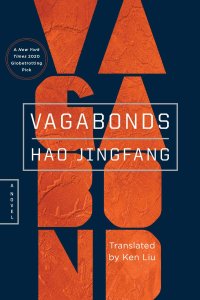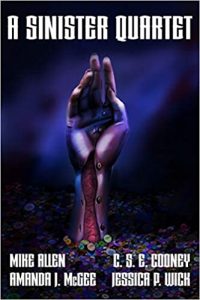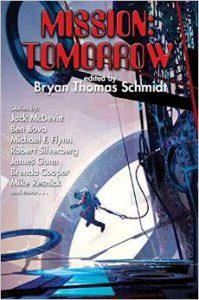Paul Di Filippo Reviews Vagabonds by Hao Jingfang
 Vagabonds, Hao Jingfang (Saga Press 978-1-5344-2208-7, $28.99, 608pp, hardcover) April 2020
Vagabonds, Hao Jingfang (Saga Press 978-1-5344-2208-7, $28.99, 608pp, hardcover) April 2020
The growing corpus of Chinese science fiction translated into English—mainly, as in this case, by that indefatigable polymath, Ken Liu—receives a welcome addition in the form of Hao Jingfang’s meditative and stimulating Vagabonds, arriving on the heels of her award-winning story, “Folding Beijing”. Part of the pleasure of such works is getting the perspective of writers from another land who employ the toolkit of SF in ways that Western, Anglo writers do not. That’s certainly the case here. No USA-raised or UK-raised SF writer currently operating would have conceived of and presented this story or these themes in the manner that Jingfang chooses. Her tale is truly equivalent to a dispatch from another planet.
We are in the year 2201, and looking at two rival polities: the planet Earth, which currently operates under a kind of ultra-capitalism based on “intellectual properties,” and the planet Mars, which is more of a collectivist state: guaranteed basic incomes, lifetime employment in a professional “atelier” group, assigned housing. The two planets fought a long war, and now exist in an uneasy peace. In an attempt to strengthen the comity, Mars earlier dispatched a group of young people to Earth, the so-called “Mercury Group,” where they could serve for two years as goodwill ambassadors. Now the young adults are returning to Mars, with a reciprocal delegation from Earth. Our initial focus, amidst a panoramic cast, is on Luoying, a dancer and granddaughter to Hans Sloan, Mars’s consul or chief ruler; and on an Earth documentary filmmaker, Eko Lu. Besides being tasked with filming the historical proceedings, Eko has a covert mission. His recently deceased mentor, Arthur Davosky, once spent some pivotal years on Mars, abandoning the planet in mysterious circumstances, and Eko feels obliged to try to solve the mystery of his mentor’s time there.
This synopsis of the setup might indicate an immediate literary parallel: Ursula Le Guin’s The Dispossessed. And indeed, that template can very arguably be overlaid on Jingfang’s novel. But there are resonances with other works: Kim Stanley Robinson’s Mars sequence; Robert Heinlein’s The Moon Is a Harsh Mistress; and John Kessel’s The Moon and the Other. However, Vagabonds departs from these models in a major way. It is a meandering, discursive, low-action, deliberately calm and uneventful “novel of ideas.” It is more akin to an old-school utopia like Samuel Butler’s Erewhon—“Here, honored visitor, you see our highly efficient protein factories where we turn the formerly useless switchgrass into manna for the masses.” —or to the didactic novels of H. G. Wells like Ann Veronica—“But father, surely you must realize that a new woman’s soul can never be trammeled by these archaic patriarchal platitudes.” (Both quotes invented by me, so don’t go looking for them!)
For some six hundred pages we are going to follow Luoying and her peers as they wrestle in slow motion with the new perspectives and understandings inculcated by their stay on Earth, and seek how best to apply their new wisdom to bringing about change in their Martian society. (This aspect brings up another Heinlein classic, Stranger in a Strange Land. Jingfang almost makes it explicit when she has a character remark, “Don’t you think it’s funny that a Terran [Eko Lu] is trying to save Earth with lessons learned from Mars, while a bunch of Martian kids are trying to save Mars with lessons learned on Earth?”) They speak of a revolution, but if this is a revolt, it’s the quietest, most polite revolution in the history of the species. Do not expect sturm und drang or blood in the streets. This book makes the brainy deliberativeness of The Dispossessed look like a Michael Bay film.
This is not to proclaim that the book is hard reading. To the contrary, I found it inviting and rewarding in a strolling fashion, once I adapted to those foreign rhythms and concerns I alluded to above. Jingfang’s prose, as translated by Liu, flows smoothly, offers passages of beauty, and limns her characters deeply. But despite certain professed outbreaks of feeling, there’s really no tensions or high drama. And despite some wan romance, these are the most sexless young adults imaginable. It’s all politesse and intellectual ponderings and group consciousness-raising sessions. Eko Lu, as Earthman, is the liveliest figure—but then Jingfang sends him back to Earth after the first third of the book! He surfaces only in intermittent epistolary fashion thereafter.
The biggest setpiece of action—and nicely done it is—involves an outlaw expedition by the Mercury Group to the abandoned crater where the original Mars settlement was, to discover old secrets. In addition, Luoying conducts some archival sleuthing with the help of the charmingly portrayed Dr. Reini that lays bare her family’s secrets which also underpin the war with Earth. Finally, at the climax, some heroism by a lad named Anka evokes true pathos.
However, the reader must be prepared to encounter innumerable tell-don’t-show passages bordering on infodumps, such as this:
On Mars, life was a matter of tradition. Every child’s path was similar to every other child’s: go to school at age six, volunteer for public service at nine, start to think about one’s future direction at twelve, be excited with the first set of electives at thirteen. Students could choose to intern at different ateliers, and once they had accumulated enough credits, they could pick areas of interest to study in depth, write papers, assist more experienced professionals, and then decide on an atelier. They also worked in stores, workshops, mining stations—but those experiences were also part of the atelier internships. They were volunteers aiming to acquire experience. No one did anything useless; no one went off on their own. Everyone ended up at a permanent atelier, with a number, a file in the Registry, a straight road that one followed until death.
Or this:
In Martian architecture, the concept of membranes was very important. The interiors of all buildings were coated, because by adding certain substances to the glass and augmenting them with different coatings, it was possible to give the walls and the ceiling different functions: the quarter-reflective membrane redirected all the infrared rays inside the rooms, keeping them warm; high-resistance wires provided heat; optical membranes served as displays; high-magnetic-moment membranes moved objects. More than practical conveniences, these membranes were a lifestyle: the furniture and the house were one, and one needed not take everything with them as they moved about the house.
Readers who have enjoyed Jo Walton’s Thessaly Trilogy and Ada Palmer’s Terra Ignota series will be well-primed to take a long luxuriant soak in Jingfang’s novel, which rivals these predecessors in its earnest engagement with the underlying paradigms of how humans may conceivably organize their lives for the better.
 While you are here, please take a moment to support Locus with a one-time or recurring donation. We rely on reader donations to keep the magazine and site going, and would like to keep the site paywall free, but WE NEED YOUR FINANCIAL SUPPORT to continue quality coverage of the science fiction and fantasy field.
While you are here, please take a moment to support Locus with a one-time or recurring donation. We rely on reader donations to keep the magazine and site going, and would like to keep the site paywall free, but WE NEED YOUR FINANCIAL SUPPORT to continue quality coverage of the science fiction and fantasy field.







